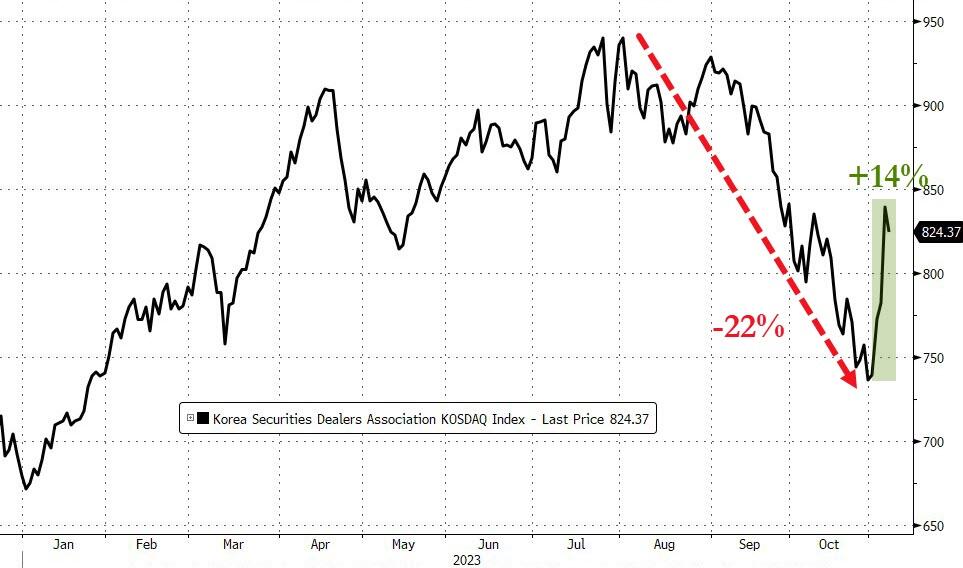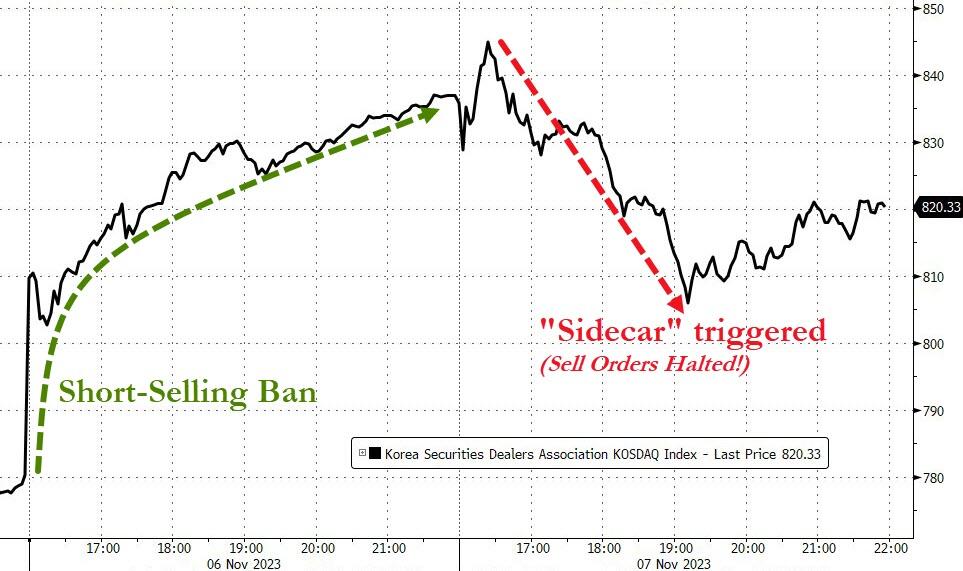
 Image Source: Pixabay
Image Source: Pixabay
Who could have seen that coming…Much like the rest of the world, after exuberant run-ups in the first half of the year, Korean equity markets plunged over 20% in the past three months… 
Clearly, this is unacceptable and so, over the weekend, South Korean regulators unleashed a “short-selling ban” on equity investors… because blaming those nasty un-patriotic short-ers is easier than admitting 1) perhaps the valuation was extreme to start with and/or 2) there is an actual economic problem here.The Financial Services Commission’s order to prohibit new short-selling positions on stocks in the Kospi 200 Index and Kosdaq 150 Index through the end of June 2024 left many market watchers surprised, with some observers saying that broad outright bans like this only make the market less transparent and therefore less attractive.Note that the decision doesn’t impact existing positions.The kneejerk reaction was – of course – a buying frenzy on Monday (Kospi up 5.7% – the best day since March 2020).But, the move raised questions as Huh Jae-Hwan, an analyst at Eugene Investment & Securities, pointed out, it is “unusual” as authorities are comprehensively prohibiting short selling at a time when there is no major external risk.As Bloomberg reports, South Korea had banned short selling during the Global Financial Crisis in 2008, amid the euro-zone debt crisis and the US sovereign downgrade in 2011, and then again during the start of the pandemic in 2020.
“There is a possibility that international investors may lose trust and opportunities in the Korean market,” said Wongmo Kang, an analyst at Exome Asset Management.
“Without the ability for investors to express a view that markets and individual stocks are ‘mispriced’ to the upside, stock markets lose long-term credibility on the world stage.”
And so, overnight (Tuesday in Korea), the equity market crashed, with KASDAQ Futs plunging over 7% at one point…  So what did Korean regulators do? You can’t make this up… The Korea Exchange temporarily issued its “sidecar” limit to halt sell orders for program trading.
So what did Korean regulators do? You can’t make this up… The Korea Exchange temporarily issued its “sidecar” limit to halt sell orders for program trading.
“The ban may boost prices of a few specific stocks for a few days, but over the longer haul it will increase overall price volatility, reduce market liquidity and make pricing less efficient,” said Hyosung Kwon, an economist at Bloomberg Economics.
“Even worse, it could discourage investment and further deepen the discount on South Korea’s stocks, hurting the retail investors it was supposed to protect.”
How many more times do we have to see this “short-selling-ban” plan fail for regulators to realize it makes things worse not better.
“Banning short-selling is like removing a lighthouse during a storm,” said Kher Sheng Lee, Asia-Pacific co-head of the Alternative Investment Management Association, a global industry body whose members oversee more than $2.5 trillion of assets in hedge and private credit funds.
“It not only strips the market of its vital pricing signals but also dries up liquidity – the very lifeblood of trading. Such bans should be a last resort.”
…will regulators never learn?Of course, the real reason for this move is far more simple… South Korea is set to conduct general elections for the National Assembly in April. “The chance of this ban being part of a strategy to win votes couldn’t be ruled out, considering how unpopular short-selling is among retail investors,” said Hong Sung-gul, professor of public administration at Kookmin University in Seoul.More By This Author:Why Do People Immigrate To The US?
Labor Shortage Hits US Coast Guard, Forces Reduction In Active Fleet Of Cutters
Senior Loan Officer Survey Shows Modest Improvement Even As Credit Remains Tight, Demand Weak















